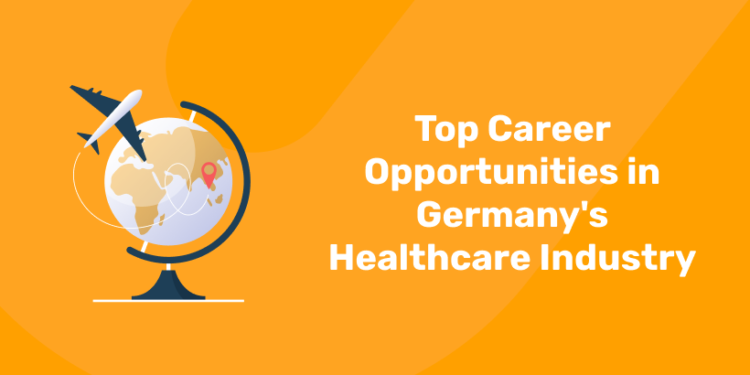Table of Contents
Key Takeaways:
- Germany’s healthcare sector will remain one of the strongest sources of skilled jobs in 2026, especially in nursing, elder care, medicine, and allied health.
- International professionals can enter via academic routes or vocational Ausbildung programs, both leading to stable, regulated careers.
- Competitive salaries, strong social benefits, and access to Schengen travel make healthcare careers in Germany attractive for long-term life planning.
- Success depends heavily on recognized qualifications, German language proficiency (ideally B2 or higher), and readiness for cultural and professional adaptation.
- Focused language training, such as Entri’s German course, combined with early planning and clear documentation, dramatically increases the chances of a smooth transition into Germany’s healthcare workforce.
Introduction
Imagine starting your workday in a modern hospital or clinic where systems are organized, teams are structured, and your skills are genuinely needed. For many healthcare professionals from India and other countries, Germany has become exactly that kind of destination—a place where hard work is matched with respect, stability, and real career growth. In 2026, this trend is only getting stronger as Germany continues to expand its healthcare services and faces a growing shortage of qualified staff.
At the same time, the move is not just about a higher salary or a foreign job title. It is about building a long-term life—access to high-quality public services, a safe environment, excellent transport, and the ability to travel across Europe with a Schengen visa while building a serious healthcare career. This blog walks through everything you need to know: in-demand roles, entry routes like Ausbildung and academic pathways, salaries, work culture, visa rules, language needs, and how to realistically prepare from your home country.
 What Are the Top In-Demand Healthcare Jobs in Germany in 2026?
What Are the Top In-Demand Healthcare Jobs in Germany in 2026?
1: How do you say "Good Morning" in German?
Germany officially lists healthcare occupations—especially nursing and elderly care—as shortage professions, and this gap is expected to widen due to demographic change. The country is also investing in medical technology and hospital infrastructure, which is creating fresh roles in diagnostics, digital health, and medical devices.
Key in-demand roles include:
-
Nurses and geriatric caregivers
- Germany needs tens of thousands of additional nurses and caregivers over the next decade for hospitals, nursing homes, and ambulatory services, with elder care being one of the fastest-growing areas.
- Internationally trained nurses who get their qualifications recognized and reach at least B2 German have good chances of permanent positions and long-term residence. (Read in detail)
-
Doctors and medical specialists
- There is consistent demand for general practitioners, internal medicine specialists, anaesthesiologists, surgeons, psychiatrists, and paediatricians, especially in smaller towns and rural regions.
- Foreign doctors who complete the recognition process and achieve the required language and professional exams can access structured career ladders in hospitals and clinics.
-
Allied health professionals
- Physiotherapists, radiographers, lab technicians (MTLA/MLT), OT/OTA, speech therapists, and pharmacists are increasingly in demand as healthcare services expand and diagnostics become more technology-driven.
- Many of these roles are open to international candidates via degree recognition or vocational training (Ausbildung), provided language and licensing requirements are met.
-
Healthcare administration and management
- Hospitals and large practices need professionals in hospital administration, medical coding and billing, quality management, health insurance, and health economics.
- This area is especially attractive for those with a mix of healthcare background and management or data skills, as Germany’s system is highly regulated and documentation-heavy.
-
Digital health and health IT
- Roles include EHR implementation specialists, telemedicine coordinators, health data analysts, and IT staff working on medical devices and health platforms.
- Professionals who combine healthcare domain knowledge with IT, data analytics, or cybersecurity are well-positioned as Germany digitizes hospitals and insurance systems.
Free German A1 Mock Tests – Powered by AI!
Test your skills on our interactive platform. Get instant feedback from our AI to help you communicate better and track your progress. Start your free German mock test now.
Test Your German A1 for FreeHow Strong Is Germany’s Healthcare Industry in 2026?
Germany has one of the largest healthcare markets in Europe, with spending accounting for a substantial share of its GDP and a dense network of hospitals, clinics, and rehabilitation centres. Health insurance is compulsory and largely statutory, which ensures a stable demand for medical services and jobs even during economic slowdowns.
Several long-term trends are shaping 2026 and beyond:
- An ageing population and high life expectancy are driving demand for chronic disease management, rehabilitation, and long-term care.
- The government is promoting hospital modernization, medical technology, and digital health infrastructure, which further increases the need for qualified staff.
|
German A2 Exercises – Download Free PDF |
||
Why Is Healthcare a High-Potential Sector for International Professionals?
Healthcare is considered one of Germany’s most secure and future-proof sectors, with some of the most critical shortages across all professions. Unlike some industries that fluctuate with the economy, healthcare demand is largely constant and in many areas growing.
For international professionals, this translates into:
- High job security and predictability: Once you are licensed and integrated, contracts are often long term with clear rules for working hours and overtime.
- Paths to long-term residence: Many healthcare roles qualify for skilled worker residence permits and, after a few years, permanent residency and potential citizenship.
You might also like: Top Industries and Career Opportunities in Germany
What Entry Routes Exist: Academic Degrees vs Ausbildung?
Germany offers two main structured pathways for entering the healthcare workforce as an international candidate, each suited to different backgrounds and goals.
Academic route
This pathway is ideal for:
- Doctors, pharmacists, physiotherapists, and other professionals who already hold recognized university degrees or plan to pursue full degrees in Germany.
- Students willing to complete undergraduate or postgraduate programs in German universities, which often combine theoretical education with clinical practice.
Key points:
- Degrees obtained abroad typically go through a recognition and equivalence check (Anerkennung).
- Depending on your profession, you may need to pass knowledge exams, language tests, and adaptation periods before full licensing.
Ausbildung (vocational training) route
The Ausbildung route is especially popular for nursing and caregiving roles.
- Healthcare-related Ausbildung programs (e.g., general nursing, geriatric care, MTA, OTA) usually run for about 3 years and combine classroom teaching with on-the-job practical training.
- Trainees receive a monthly stipend, which can increase each training year, and many are offered full-time positions after completion.
For many international candidates, Ausbildung is attractive because it lowers upfront study costs, allows earning while learning, and provides a structured path to employment and residence.
Free German A1 Mock Tests – Powered by AI!
Test your skills on our interactive platform. Get instant feedback from our AI to help you communicate better and track your progress. Start your free German mock test now.
Test Your German A1 for FreeWhat Qualifications and Skills Do You Need?
Germany is strict about patient safety, so qualifications and skills are carefully regulated, but clear pathways exist once requirements are understood.
Educational qualifications and recognition
- Your degree, diploma, or vocational certificate must be assessed and recognized as equivalent to German standards, especially for regulated professions such as doctors, nurses, physiotherapists, and pharmacists.
- In some cases, authorities may ask you to complete adaptation periods, bridging courses, or take a knowledge test (Kenntnisprüfung) to close gaps.
Language requirements
- For nurses and most clinical staff, B2 level German is commonly required; for doctors, B2–C1 plus a specific medical language exam is typical.
- Certain Ausbildung programs may accept B1 at the start with the condition that you reach B2 during training, but higher levels always improve your chances.
Soft and digital skills
- Empathy, patience, clear communication, and the ability to work in multidisciplinary teams are essential in German hospitals and care institutions.
- Comfort with digital tools, EHR systems, and documentation software is increasingly expected, especially in hospitals undergoing digital transformation.
Also read: What Level of German is Required to Work in Germany?
What Are Typical Salaries and Work Conditions in German Healthcare?
Salaries depend on experience, region (East vs West, rural vs urban), type of institution, and collective bargaining agreements, but healthcare roles generally offer solid and stable earnings with strong benefits.
Sample salary ranges (approximate gross annual)
| Role / Level | Approx. Salary Range (per year, gross) | Notes |
|---|---|---|
| Staff nurse (entry to a few years’ exp.) | €32,000 – €45,000 | Higher in large cities/university hospitals; shifts and allowances can add more. |
| Senior nurse / ward leader | €45,000 – €55,000+ | Depends on responsibilities and experience. |
| Geriatric caregiver (after Ausbildung) | €30,000 – €40,000 | Allowances for night/weekend shifts may apply. |
| Medical lab technician / radiographer | €35,000 – €50,000 | Varies by specialization and employer. |
| Physiotherapist | €32,000 – €45,000 | Higher income possible with experience and private practice. |
| Hospital administrator / coordinator | €38,000 – €55,000 | Depends on role level and organization size. |
| Resident doctor (Assistenzarzt) | €55,000 – €75,000 | Increases with training year and specialty. |
| Specialist doctor (Facharzt) | €80,000 – €120,000+ | Strong variation by specialty, experience, and setting. |
- Regulated working hours, paid vacation (often around 25–30 days per year), and additional days for night or weekend work in some agreements.
- Comprehensive social benefits: health insurance, unemployment insurance, pension contributions, and protections related to maternity, sickness, and workplace safety.
How Is the Work Culture, Lifestyle, and What About the Schengen Advantage?
Germany’s healthcare work culture is professional, structured, and team-oriented, with high expectations for punctuality, documentation, and adherence to protocols. International professionals often find that once they adjust to the system, clarity of roles and standards helps reduce workplace chaos compared to less regulated environments.
From a lifestyle perspective:
- You benefit from reliable public transport, safe cities, green spaces, and strong public services—from schools to healthcare.
- Many regions offer vibrant international communities, especially near major hospitals and universities, making integration easier over time.
A major bonus of working in Germany is that your residence status typically enables you to move freely with a Schengen visa/residence permit across 26 European countries for short stays. This means weekend trips or holidays in neighbouring countries like France, Austria, Switzerland, or the Netherlands are simple and relatively affordable once you are settled.
What Are the Visa, Work Permit, and Relocation Basics?
Germany has updated its immigration laws to attract more skilled workers, including healthcare professionals, making pathways clearer than before.
Key steps generally include:
-
Qualification and language readiness
- Complete your healthcare qualification and achieve at least B1–B2 German, depending on role and route.
-
Recognition of your qualification
- Submit documents to the relevant recognition authority (e.g., for nursing or medicine) and follow their decision on any additional steps or exams.
-
Job offer or Ausbildung contract
- Secure a work contract or Ausbildung place with a German employer; many employers actively recruit from abroad for nursing and caregiving.
-
Visa application
- Apply for the skilled worker visa, EU Blue Card (where applicable), or Ausbildung visa with proof of language level, recognition stage, finances, and insurance.
-
Arrival and integration
- Register your address, complete residence permit formalities, and continue language and integration courses while working.
What Challenges Will You Face—and How to Handle Them?
Moving into another country’s healthcare system is rewarding but demanding. Being aware of the challenges early helps you plan better.
Common challenges:
- Language and communication: Understanding dialects, fast speech, and medical shorthand takes time even after B2; structured practice and immersion are critical.
- Cultural and workstyle differences: Direct communication, strict adherence to protocols, and detailed documentation can be a shift from what many are used to.
- Emotional load and shift work: Night shifts, end-of-life care, and emotionally intensive patient contact require resilience and good support systems.
Ways to cope:
- Take specialized German courses that focus on medical vocabulary and real clinical scenarios.
- Seek mentors, peer groups, or integration programs offered by employers or local authorities to navigate both work and everyday life.
|
Goethe 2026 Exam Dates: Multiple Test Centers |
|
| Trivandrum Goethe Exam Dates | Kochi Goethe Exam Dates |
| Chennai Goethe Exam Dates | Coimbatore Goethe Exam Dates |
How Will Future Trends Shape Healthcare Careers Beyond 2026?
The outlook for healthcare careers in Germany remains positive—and in some areas, demand is expected to intensify.
Key trends:
- Ageing population and long-term care: Increasing numbers of elderly people mean rising demand for geriatric care, rehabilitation, and home-based care services.
- Digital health expansion: Telemedicine, AI-supported diagnostics, and health data platforms are creating hybrid roles that combine clinical expertise with technology skills.
- Preventive and outpatient care: More services are shifting from inpatient to outpatient settings, creating additional roles in clinics, rehabilitation centres, and community care.
Professionals who invest in continuous learning—whether in specialized clinical areas, management, or digital skills—will have the strongest long-term prospects.
How Can Learning German Boost Your Healthcare Career—and How Does Entri Help?
Language is often the deciding factor between simply being eligible and actually thriving in Germany’s healthcare industry. Strong German skills improve your ability to understand patient histories, coordinate with colleagues, handle documentation, and sit for recognition exams. They also influence hiring decisions and can directly impact your career growth and salary over time.
Entri’s German Language Course is designed to support learners aiming for overseas opportunities, including healthcare careers in Germany. While details can evolve, the course typically focuses on:
- Structured preparation for levels up to B1/B2, which are commonly required for nursing, caregiving, and Ausbildung programs.
- Practical, conversation-based learning with emphasis on real-life scenarios such as hospital communication, patient interaction, and workplace dialogues.
- Flexible online learning suited to working professionals, along with exam-oriented guidance to clear standardized German tests.
For aspiring doctors, nurses, and allied health professionals, combining a recognized qualification with strong German skills from a focused course like Entri’s significantly increases chances of securing visas, jobs, and faster integration into German workplaces.
Conclusion
Choosing Germany for your healthcare career in 2026 is not just about landing a job abroad—it is about building a stable, respected profession in a system that needs your skills and invests in your growth. With clear shortages across nursing, elder care, and medical specialties, structured pathways like academic degrees and Ausbildung, and the added lifestyle benefits of living and travelling in Europe, Germany offers a powerful combination of opportunity and quality of life.
If you are serious about this path, start where it matters most: strengthen your qualifications, plan your recognition process, and commit to mastering German with the help of structured programs like Entri’s German Language Course. With the right preparation and patience, the hospital corridors and care homes of Germany can become the setting for a deeply rewarding professional and personal journey.
Free German A1 Mock Tests – Powered by AI!
Test your skills on our interactive platform. Get instant feedback from our AI to help you communicate better and track your progress. Start your free German mock test now.
Test Your German A1 for FreeFrequently Asked Questions
Are healthcare jobs in Germany really secure for the long term?
Yes. Due to demographic change and ongoing staff shortages, healthcare is considered one of Germany’s most secure sectors, with long-term demand across hospitals, clinics, and elder-care facilities.
Can I apply for nursing jobs in Germany directly from India or my home country?
Many German employers and agencies recruit nurses and caregivers directly from abroad, provided you have relevant qualifications, at least B1–B2 German, and you begin or complete the recognition process.
Is Ausbildung a good option if I already have a nursing degree?
For some candidates, yes. If recognition of your existing degree is complex, doing an Ausbildung in Germany can provide a clear, paid pathway to work and residence while aligning fully with German standards.
Do I need C1 German, or is B2 enough?
For most nursing and caregiving roles, B2 is the typical requirement, while doctors often need C1 plus specific medical German exams. Higher levels always improve your employability and integration.
How long does it usually take to move from first planning to actually working in Germany?
Timelines vary, but many candidates need 1.5–3 years to complete language learning, recognition processes, job search, visa procedures, and relocation. Starting German early and following a structured plan shortens this path.



 What Are the Top In-Demand Healthcare Jobs in Germany in 2026?
What Are the Top In-Demand Healthcare Jobs in Germany in 2026?










